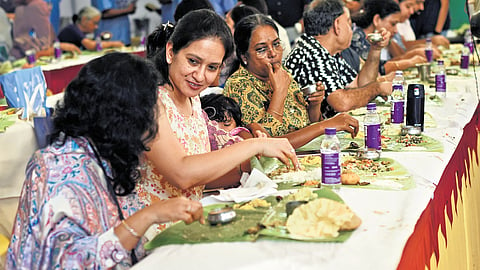

CHENNAI: Beyond the magic of ragas and the poetry of Bharatanatyam, Margazhi harbours the irresistible charm of sabha canteens. These bustling hubs of culinary delight have long been a vital part of the city’s music season, offering mouth-watering items from crispy dosais to creamy elaneer payasam. But these canteens are more than just pit stops for ravenous rasikas — they offer spaces of camaraderie, tradition, and nostalgia for the performers themselves.
Filter coffee and fervor
Margazhi is a time of reflection and gratitude for Nirmala Rajasekar, musician and vainika. “I began performing when I was 13, and now, over four decades later, I still marvel at Margazhi’s rich tradition. It’s a season for us to think about what we’ve done and what we can offer to the future,” she says.
For Nirmala, these canteens hold decades of special memories. “I met the legendary maestro Voleti Venkateswarulu at the Music Academy canteen when I was a teenager. Over a meal of dosas, I was introduced to him by my guru.” As for sabha canteen menus, Nirmala is a firm believer in the magic of filter coffee.
“South Indian filter coffee is one of the best drinks ever created,” she exclaims. While she keeps meals light before a concert, post-performance is a different story. This year, she indulges in masala dosai at Narada Gana Sabha, marvels at the spread at Parthasarathy Swami Sabha, and relishes pathir peni with almond milk.
Settled in the US, Anwesha Das — who has dedicated three decades to Bharatanatyam — makes it a point to return to the city she grew up in, almost every year for at least one performance.
“Performing during Margazhi is a humble offering of my love for the art form in a space where Bharatanatyam thrives in all its glory,” says the dancer, who had her arangetram in 2000 before moving to the US in 2007 for higher education.
“My go-to sabha canteen food is usually a rava dosai with filter coffee. If I’m in a rush, it’s a vada with filter coffee, but filter coffee is a must. I feel there’s something special and wholesome about the way the caterers prepare meals for rasikas.”
Dosa diplomacy, sweet tales
As a child, Srekala Bharath recalls her mother whipping up rava dosai and sambar vadai after rigorous dance sessions. Now, a seasoned performer for over 50 years, she says, “Every year, I relive those moments at the canteens.”
For her, the canteen experience is about more than food. “Post performance, sitting with students, artistes, and rasikas, discussing performances while savouring sabha food, creates a wholly unique dimension. It’s something only Margazhi offers.” Her thematic Bharatanatyam productions, including this year’s Deva Madhargal, are a highlight of the season.
Celebrated vocalist Sudha Ragunathan has seen over four decades of Margazhi, from her competition days to the grand stage. “The season has evolved, bringing in younger talent and diverse audiences. It pushes us to reconstruct older kritis and innovate.” The innovation in sabha menus mirrors the creativity on stage, she says.
“The caterers give traditional recipes such an interesting twist, just like how we bring freshness to our performances.” Sudha’s all-time favourites are pumpkin halwa and kasi halwa, along with hot bondas and kothamalli chutney. “I remember once eating a betel leaf bajji and jackfruit paniyaram — now, sabha canteens even offer millet varieties!”
Innovation is what brought Bharatnatyam dancer Anugraha Sridhar one of life’s unexpected joys. “I chose my wedding caterer at the Brahma Gana Sabha canteen,” she laughs.
“I tried their sapota kesari, and it was so good that I decided then and there they’d cater my wedding, even though I didn’t know who or where I was marrying!” Her other favourite dish is the keera vadai, which is “heartwarming and pairs beautifully with the memories I associate with this festival.”
Ghee roast and good vibes
Singer Rithvik Raja describes Margazhi as a season of excitement. “This year is extra special — it marks 20 years of singing during the season.” For him, Margazhi is more than just a performance calendar; it’s been a transformative journey of artistry and connection.
“During my early years, a bunch of us would sabha-hop, catching five concerts a day and enjoying meals in the canteens. Good meal and great company,” says Rithvik. His favourite sabha dish is a tie between Narada Gana Sabha’s sevai varieties and ghee podi dosai with strong filter coffee at the Music Academy canteen.
Laasya Narasimhachari’s connection to Margazhi is steeped in family tradition. “Our 54-year-old Kalasamarpana Foundation has made Margazhi a time of dance dramas and solo performances, often with all four of us — my parents, sister, and I — performing together.”
Her fondest food memory? “The masala dosai from Narada Gana Sabha’s Woodlands canteen in the ’90s. After performances, my father would treat the entire crew to dinner. Sitting together, savouring dosais after a production, was the perfect blend of dance and delicious food.”
So is it even Margazhi if you haven’t debated the best ghee roast or gone for a second serving of halwa? The sabha canteens are as much a stage as the concerts, and conversations flow as freely as the filter coffee. Between crispy dosais and sweet memories, you can’t help but wonder: is the magic of Margazhi in the ragas, or in that extra serving of chutney.
Payasam and performance
Veena maestro Jayanthi Kumaresh likens Margazhi to a family function. “Many of my cousins, aunts, and uncles perform during this season, making it feel like a reunion of sorts.” Her go-to dish is the elaneer payasam at Parthasarathy Sabha’s canteen. “I don’t eat much during the festival because I have to watch my diet, but the payasam is great!”